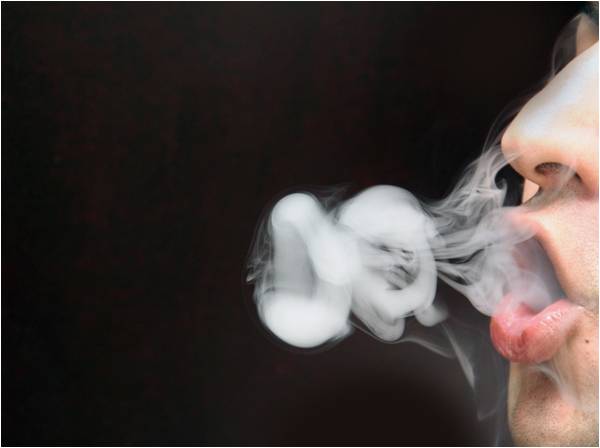
I never tried to quit smoking before I actually did. Not once in over a decade, not even for a day. I always just assumed, like I do with most things in my life, that when I wanted to it would happen. Thanks to a recent bout of jaundice, it recently did just sort of happen, like Douglas Adams’ trick for flying (“Easy! You just fall down and miss the ground.”). I’m grateful I didn’t have to go through the jittery angst that must accompany soberly trying to resist temptations. The sickness of Hep A was so unpleasant, affecting everything from food and drink to social thresholds, that the withdrawal from nicotine sort of faded in the general awfulness of things. I grew up hating the smell of cigarettes, associating it with defeat and depression. But I loved the act of smoking: the ceremony of unwrapping the plastic from the pack, the obvious pleasure of taking out the first ciggy from the rows of crowded circles, the way it made all the grown-ups look like consequential actors in classy Hollywood flicks.
My mother was a smoker for practically as long as I can remember, and I thought her impossibly glamorous for it. I would watch her and her friends at weddings and dinner parties air-kissing one another and then settling down to pull out a long, fresh cigarette that dangled between their red lips, often staining their Silk Cut butts. They would light up with the big chunky lighters you see in old movies, the ones that look like lanterns, before sharply inhaling and setting the end aglow with a determined satisfaction. While nodding at the latest gossip, thin tendrils of bluish-grey smoke would sinuously escape from their nostrils or – and this was my favorite part – shoot out quickly like an arrow of dragon’s breath as they titled their head upwards and then flicked their hand through the air as if there were flies around them before sanding stationary again, their hands held aloft, the smoke travelling upwards like a homing beacon. Women’s hands hung limply on crossed elbows, a cigarette balanced between the first two fingers made even the pudgiest aunties look masterly and mysterious.
Men on the other hand made smoking look like a drug. Large, hairy fingers would hold the butt harshly like a dart while dragging it to the edges of the mouth for a quick, deep breath. My adoration never really extended to cigars, which I still think of as a really rude thing to smoke in public since practically no one but you is enjoying it.

Actually, I’m even old enough to remember chirpy air-hostesses asking my parents, “Smoking or non-smoking seat?” when they checked into flights. Fetus though I was, I still thought it highly useless to make a distinction between the two since everyone was breathing the same smoky air.
When I learned about smoke-related diseases at school I implored my mother to quit, rattling off statistics about emphysema and lung cancer and showing her pictures of diseased flesh that used to be people’s throats. Then something happened around the time I was 17 that made me very angry with the world indeed. I had been good and kind and it had come to nothing. So why not, I thought, why not start smoking and show ‘em all (hmph! I added triumphantly after the first, tarry drag). You have to really want to smoke. It’s not something that just happens after one or even ten tries. It takes will, even dedication. I began with Dunhill reds, a delightfully mature brand which sported reassuringly long and hefty ciggies in two gold pockets. God, how I loved those packs. I smuggled them into school by hiding them in my coat pocket. Fellow bad-asses would spot the conspicuously square bulge and wink at me knowingly. It’s a cliché that young smokers are cool. There is something about the inviolable freshness of a young face that makes a cigarette look vastly different from the feeling you get when you see a fifty-something smoker hacking up bits of things as they speak to you in a raspy voice behind yellowing teeth of a time gone by. It’s what tobacco advertising is premised upon.
Later, in college, smoking became an identity. It set me apart from the judgmental and painfully health-conscious Americans and was sure to attract fellow arty-rebel types. Finally having a habit to accessorize, I bought filters and Zippos and ashtrays and silver cigarette cases and all manner of accouterments to bling out my daily puff. I met most of my friends while huddled outside non-smoking buildings on wintery nights, puffing away like air fresheners of death. It was an instant way to break the ice, which is not a small achievement in a city of strangers. Same thing at bars, at clubs, at restaurants and at the theatre. You always had a companion in the smoking section, fellow soldiers in the battle against conformity.
The only time I questioned my habit was at airport smoking rooms. You should send your children to those rooms to make them scared of the habit: wide-eyed, jittery, pale-faced but dark-hearted creatures cower there, hidden in corners while furiously dragging on their fourth fix in three minutes. If cancer were a perfume, it would smell like airport smoking rooms (or any Pakistani airport, actually).
Now that I’ve quit I wish I could say I am a benevolent tolerant person who looks at smokers and says, ‘Oh well to each his own’ but the truth is I’m as willing to dispense judgment as any born-again Third World dictator. I’m far more likely to scream at smokers for a weakness I have already conquered. None of my friends are allowed to smoke around me, and I look at people who smoke at restaurants with the same stinky eye that I got for over a decade. Truth is I had tons of fun while smoking but I’m finished with it. It’s like there were a limited number of cigarettes allotted to me at birth, and I’ve used them all up. Shockingly, I’m OK with that.
Now I eat dried fruit because of my empty oral fixation. You can meet new people through almonds, right?
Non-smokers can write to thekantawala@gmail.com and follow @fkantawala on twitter
My mother was a smoker for practically as long as I can remember, and I thought her impossibly glamorous for it. I would watch her and her friends at weddings and dinner parties air-kissing one another and then settling down to pull out a long, fresh cigarette that dangled between their red lips, often staining their Silk Cut butts. They would light up with the big chunky lighters you see in old movies, the ones that look like lanterns, before sharply inhaling and setting the end aglow with a determined satisfaction. While nodding at the latest gossip, thin tendrils of bluish-grey smoke would sinuously escape from their nostrils or – and this was my favorite part – shoot out quickly like an arrow of dragon’s breath as they titled their head upwards and then flicked their hand through the air as if there were flies around them before sanding stationary again, their hands held aloft, the smoke travelling upwards like a homing beacon. Women’s hands hung limply on crossed elbows, a cigarette balanced between the first two fingers made even the pudgiest aunties look masterly and mysterious.
Men on the other hand made smoking look like a drug. Large, hairy fingers would hold the butt harshly like a dart while dragging it to the edges of the mouth for a quick, deep breath. My adoration never really extended to cigars, which I still think of as a really rude thing to smoke in public since practically no one but you is enjoying it.

Actually, I’m even old enough to remember chirpy air-hostesses asking my parents, “Smoking or non-smoking seat?” when they checked into flights. Fetus though I was, I still thought it highly useless to make a distinction between the two since everyone was breathing the same smoky air.
When I learned about smoke-related diseases at school I implored my mother to quit, rattling off statistics about emphysema and lung cancer and showing her pictures of diseased flesh that used to be people’s throats. Then something happened around the time I was 17 that made me very angry with the world indeed. I had been good and kind and it had come to nothing. So why not, I thought, why not start smoking and show ‘em all (hmph! I added triumphantly after the first, tarry drag). You have to really want to smoke. It’s not something that just happens after one or even ten tries. It takes will, even dedication. I began with Dunhill reds, a delightfully mature brand which sported reassuringly long and hefty ciggies in two gold pockets. God, how I loved those packs. I smuggled them into school by hiding them in my coat pocket. Fellow bad-asses would spot the conspicuously square bulge and wink at me knowingly. It’s a cliché that young smokers are cool. There is something about the inviolable freshness of a young face that makes a cigarette look vastly different from the feeling you get when you see a fifty-something smoker hacking up bits of things as they speak to you in a raspy voice behind yellowing teeth of a time gone by. It’s what tobacco advertising is premised upon.
Later, in college, smoking became an identity. It set me apart from the judgmental and painfully health-conscious Americans and was sure to attract fellow arty-rebel types. Finally having a habit to accessorize, I bought filters and Zippos and ashtrays and silver cigarette cases and all manner of accouterments to bling out my daily puff. I met most of my friends while huddled outside non-smoking buildings on wintery nights, puffing away like air fresheners of death. It was an instant way to break the ice, which is not a small achievement in a city of strangers. Same thing at bars, at clubs, at restaurants and at the theatre. You always had a companion in the smoking section, fellow soldiers in the battle against conformity.
The only time I questioned my habit was at airport smoking rooms. You should send your children to those rooms to make them scared of the habit: wide-eyed, jittery, pale-faced but dark-hearted creatures cower there, hidden in corners while furiously dragging on their fourth fix in three minutes. If cancer were a perfume, it would smell like airport smoking rooms (or any Pakistani airport, actually).
Now that I’ve quit I wish I could say I am a benevolent tolerant person who looks at smokers and says, ‘Oh well to each his own’ but the truth is I’m as willing to dispense judgment as any born-again Third World dictator. I’m far more likely to scream at smokers for a weakness I have already conquered. None of my friends are allowed to smoke around me, and I look at people who smoke at restaurants with the same stinky eye that I got for over a decade. Truth is I had tons of fun while smoking but I’m finished with it. It’s like there were a limited number of cigarettes allotted to me at birth, and I’ve used them all up. Shockingly, I’m OK with that.
Now I eat dried fruit because of my empty oral fixation. You can meet new people through almonds, right?
Non-smokers can write to thekantawala@gmail.com and follow @fkantawala on twitter

